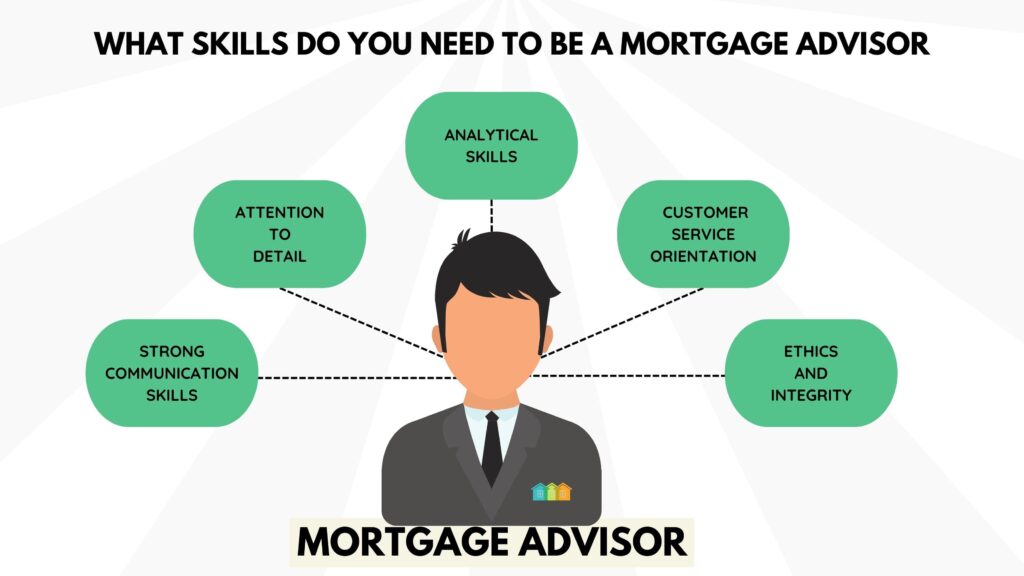
Sammie Ellard-King
I’m Sammie, a money expert and business owner passionate about helping you take control of your wallet. My mission with Up the Gains is to create a safe space to help improve your finances, cut your costs and make you feel good while doing it.

Quickfire Roundup:
Looking to become a mortgage advisor in the UK?
Begin with foundational GCSE qualifications, notably in English and Maths, then pivot towards the vital CeMAP certification offered by LIBF.
When it comes to skills, impeccable communication, keen attention to detail, strong analytical capabilities, and a commitment to ethics stand paramount.
Once certified, consider registering with industry stalwarts like the FCA. Stay updated, because the mortgage world never stands still.
I’m excited to share with you all the information you need to know on how to become a mortgage advisor.
As a mortgage advisor, you play a crucial role in helping people secure financing for their dream homes and investments.
Finding the right mortgage advisor can be tricky so building up great relationships with your potential clients so they refer you on is pivotal to your success.
In this article, we’ll explore the qualifications, skills, and steps needed to embark on this rewarding career in the United Kingdom.
Table of Contents
How to become a mortgage advisor?
To become a mortgage advisor, certain education and qualifications are required.
Obtaining the necessary qualifications not only helps you gain industry knowledge but also demonstrates your credibility to potential clients and employers.
I would add that if you put your mind to it then you can achieve anything!
Education and Qualifications

Here are the key educational requirements and qualifications:
1. Obtain relevant GCSEs
To start your journey towards becoming a mortgage advisor, having GCSE qualifications in subjects like English and Maths is highly recommended but not essential.
These subjects are crucial in developing the foundational skills needed to excel in the field.
You’ll be dealing with numbers almost every day so if you’re not proficient in Maths or have a qualification in it then consider taking courses to help improve your numeracy skills.
2. Pursue further education
While not mandatory, pursuing higher education can significantly boost your knowledge and increase your chances of success as a mortgage advisor.
Consider pursuing a degree in a related field such as Finance, Economics, or Business Studies.
Although not directly focused on mortgage advising, these degrees provide a solid understanding of financial concepts and principles.
I would add here not a requirement rather a helpful addition.
3. Complete a recognised mortgage advisor qualification
Once you have the necessary educational foundation, it’s time to focus on obtaining a recognised mortgage advisor qualification.
The most widely recognised qualification in the UK is the CeMAP (Certificate in Mortgage Advice and Practice) certification. This qualification is offered by the LIBF (London Institute of Banking and Finance).
The CeMAP certification consists of three modules that cover topics such as mortgage law, mortgage applications, and mortgage products.
Here is a link to the required qualifications at LIBF.
How much does CeMAP course cost?
4. Gain practical experience
While gaining practical experience isn’t a formal qualification, it is essential for building credibility and developing the skills necessary to succeed as a mortgage advisor.
I spoke with Peter Matthews a Senior Mortgage Advisor from Charles Derby and he said,
‘Practical experience is the most important factor for being a top mortgage advisor. I learnt everything I needed to know on the job and sometimes getting out of the textbooks and onto the job is all you need‘.
Consider working in a customer service, consumer services or sales role within the financial services industry to gain a better understanding of client needs and the intricacies of mortgage processes.

How to become a mortgage advisor - Skills required
To excel as a mortgage advisor, you must possess a combination of technical knowledge and interpersonal skills.
Now remember that these skills can be developed so don’t be alarmed if you don’t possess these right away.
I personally struggled with attention to detail so I worked on it over a number of years. Knowing your weaknesses can turn them into strengths.
Here are the key skills required to thrive as a mortgage advisor:

1. Strong communication skills: As a mortgage advisor, you will be interacting with clients on a daily basis, explaining complex mortgage terms and processes in a clear and understandable manner.
2. Attention to detail: The mortgage application process can be complex and requires meticulous attention to detail. You must ensure that all documentation is accurate and complete to avoid any complications or delays.
3. Analytical skills: The ability to analyse financial information and assess a client’s suitability for a mortgage is crucial. You should be able to evaluate different mortgage products and recommend suitable options based on individual circumstances.
4. Customer service orientation: Providing excellent customer service is paramount in this role. Building long-term relationships with clients and establishing trust is essential for success.
5. Ethics and integrity: Mortgage advisors deal with sensitive financial matters. Upholding high ethical standards and demonstrating integrity is a fundamental requirement of the profession.
Steps to becoming a mortgage advisor
Now that we have covered the education, qualifications, and skills required, let’s take a look at the steps involved in becoming a mortgage advisor:
1. Research and understand the role: Before committing to a career as a mortgage advisor, it’s crucial to thoroughly research the role and understand the responsibilities involved. This will help you make an informed decision and ensure that the career aligns with your interests and goals.
2. Obtain the necessary education: Start by meeting the educational requirements discussed earlier, such as obtaining relevant GCSE qualifications and considering higher education in a field related to finance.
3. Enroll in a CeMAP course: To become a certified mortgage advisor in the UK, enrolling in a CeMAP course is highly recommended. These courses provide comprehensive training and prepare you for the CeMAP certification exams.
4. Pass the CeMAP exams: After completing the CeMAP course, you must pass the three CeMAP exams to obtain the certification. These exams assess your knowledge of mortgage regulations, products, and the mortgage application process.
5. Gain practical experience: To enhance your practical skills and industry knowledge, consider gaining work experience in a customer service or sales role within the financial services sector.
6. Register with a professional body: Once you have obtained the necessary qualifications and experience, consider registering with a professional body such as the FCA (Financial Conduct Authority) or the CII (Chartered Insurance Institute). This demonstrates your commitment to professional standards and ethics.
7. Stay updated and continue learning: The mortgage industry is dynamic, and regulations and products can change over time. It’s essential to stay up-to-date with industry developments and continue learning through professional development courses and networking with industry professionals.

How much do mortgage advisors earn?
According to Indeed, the average mortgage advisor salary in 2023 is £38,611.
This sits nicely above the national average wage which currently stands at £33,000.
If you’re just starting out you can expect to find your wages down at around £20,000 – £25,000 which will increase as your experience grows and your client list does too!
Now, if you do out on your own and open your own mortgage advisor agency your earnings can far exceed this.
Experienced mortgage advisors in some of the top mortgage companies can earn up to £80,000 a year and for the hyper-exclusive firms this can even be in the six figures.
Bonuses and commissions are essentially where a mortgage advisor really makes his money so if you’re looking for a new firm then go with somewhere with a good client base that pays high commissions.
How do mortgage advisors earn money?
What does the day to day for a mortgage advisor look like?
I spoke to Gerard Boon, Founder of Boon Brokers to see what a day to day of a mortgage advisor inside his firm looks like.
A Mortgage Advisor in the UK assists individuals in acquiring the right mortgage. A typical day includes:
Client Consultations: Discussing financial situations and property goals, whether face-to-face, over the phone, or via video calls.
Research & Recommendation: Evaluating mortgage products to find the best fit based on client needs.
Paperwork: Gathering, reviewing, and submitting necessary documentation for mortgage applications.
Coordination: Communicating with estate agents, lenders, and solicitors to ensure transactions progress smoothly.
Market Updates: Keeping abreast of changes in interest rates, lender criteria, and industry regulations.
Admin & Compliance: Managing appointments, updating records, and ensuring all dealings are in line with regulatory standards.
Business Growth: For independent advisors, this involves lead generation, networking, and building client relationships.
Problem-solving: Addressing unique client challenges and navigating intricate property deals.
The specifics can vary, but these tasks encapsulate the core of a Mortgage Advisor’s daily responsibilities.
FAQs
What are the main duties of a mortgage advisor?
As a mortgage advisor, your main duties include providing advice to clients on mortgage options, helping them with the mortgage application process, assessing their financial circumstances, and ensuring that they select the most suitable mortgage product.
What qualifications do I need to become a mortgage advisor?
To become a mortgage advisor in the UK, it is highly recommended to obtain relevant GCSE qualifications, pursue higher education in a related field, complete a recognised mortgage advisor qualification such as CeMAP, and gain practical experience in the financial services industry.
How long does it take to become a mortgage advisor?
The time it takes to become a mortgage advisor can vary depending on individual circumstances. Obtaining the necessary qualifications and gaining practical experience typically takes several months to a few years.
Can I become a mortgage advisor without a degree?
Yes, a degree is not a mandatory requirement to become a mortgage advisor. However, having a degree in a related field such as Finance or Economics can enhance your knowledge and credibility in the industry.
Is CeMAP the only recognised mortgage advisor qualification?
CeMAP is the most widely recognised and respected mortgage advisor qualification in the UK. However, there are other qualifications available, such as the Certificate in Mortgage Advice & Practice (CertMAP) offered by the CII, which can also be considered.
Conclusion
We hope you’ve learnt everything you need to know about how to become a mortgage advisor in the UK.
Becoming a mortgage advisor requires a combination of education, qualifications, and practical experience.
By following the outlined steps and acquiring the necessary skills, you can embark on a fulfilling career helping individuals and businesses navigate the complex world of mortgages.
Stay committed to continuous learning and professional development to stay up-to-date with industry trends and provide the best possible service to your clients.
Share on social media
Disclaimer: Content on this page is for informational purposes and does not constitute financial advice. Always do your own research before making a financially related decision.


